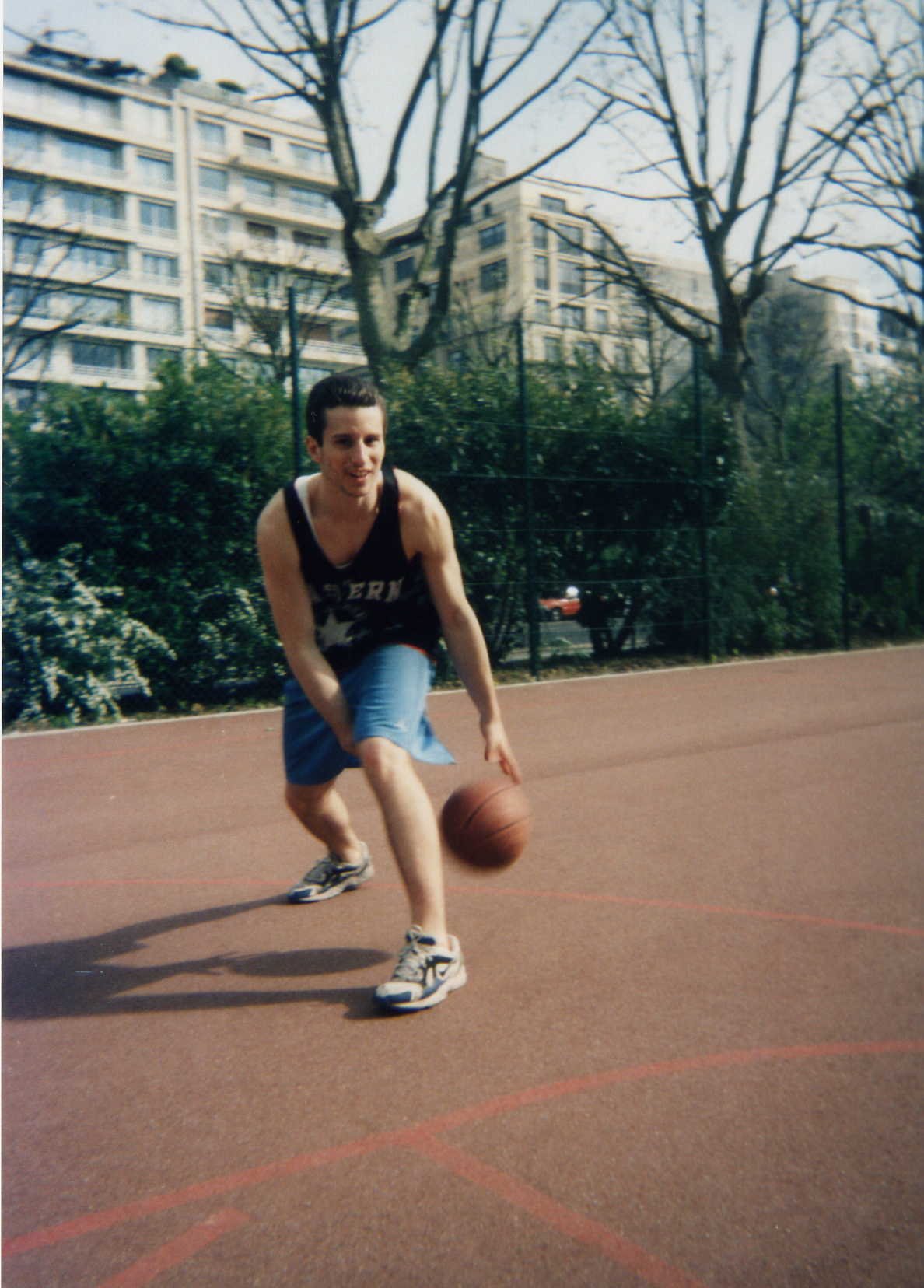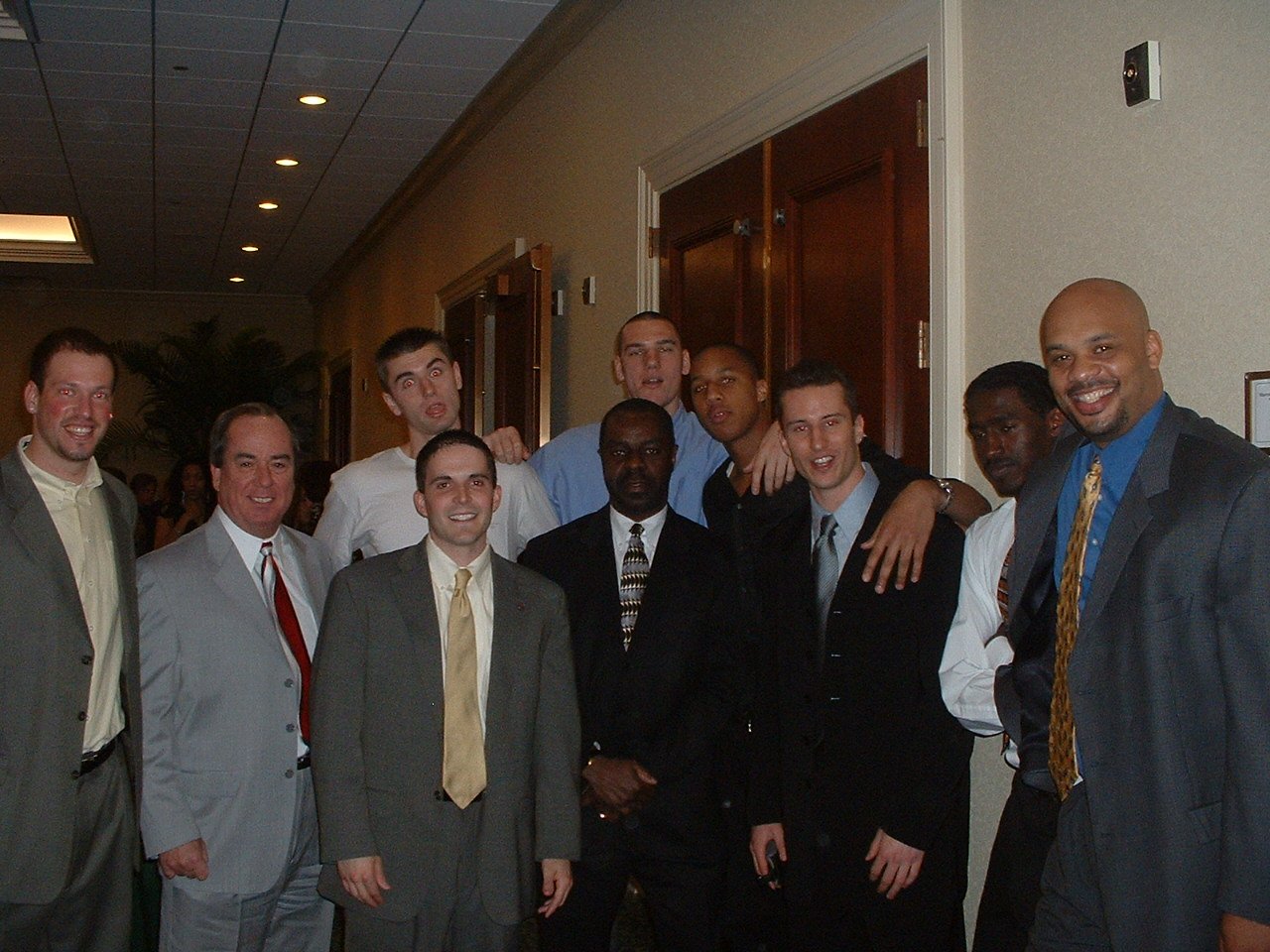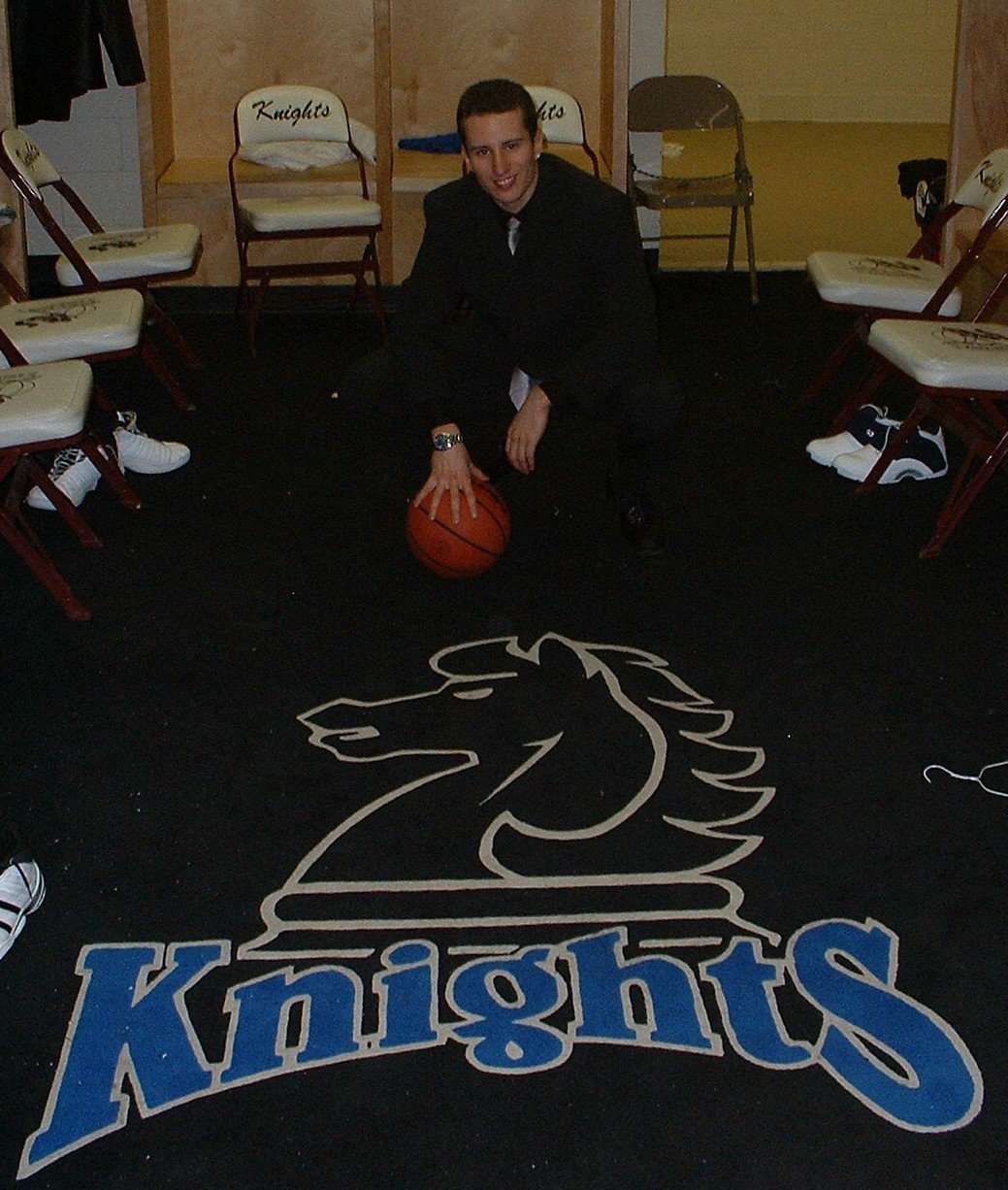🏀0️⃣1️⃣8️⃣ Rémy Raisner
Meet Rémy Raisner, a Franco-American NCAA player who helped colleagues on both sides of the Atlantic better understand the “other” through basketball.
Born September 1981 to a French father and American mother, Raisner was raised in Paris attuned to U.S. culture, but it took a while for him to fall in love with basketball. Growing up, he played soccer, tennis, and judo, before finally arriving to the hoops world as a 12-year old in 1993, inspired by Michael Jordan and the U.S. Dream Team. A few years later, Raisner departed for the United States to play D1 basketball with the Fairleigh Dickinson University Knights.
Rémy’s Story
Raisner cut his teeth playing playground basketball, the street game popularized in 1980s and early 1990s France. “I liked the culture,” he recalled of the game. “I had a bit of the American culture growing up [thanks to his Los Angeles-raised mother], so it struck a chord.”
Killer crossover. Photo: Rémy Raisner.
He then began playing with local teams in the more formally organized club structure. First with Stade Français, whose Geo André stadium, site of Jordan’s famous 1990 exhibition, was close to home. Raisner then played for Paris Saint-Germain, before matriculating with Sceaux and Bondy. His game advanced, and at age 16, he entered the youth academy at St. Quentin, two hours north of Paris. Within one year, he earned playing time with the club’s professional senior team.
Throughout these formative years, Raisner was driven by one dream. “My goal was to play in the NBA, which was a new thing at the time for French players,” he said. It was the late 1990s, and Tariq Abdul-Wahad had proved in 1997 that a French kid could make it to the league through the NCAA pipeline. This pathway intrigued Raisner, for whom obtaining a university degree was important as he wished to eventually go into the business world.
Raisner wanted to continue basketball while finishing his education, something that was difficult to do in France. Although he took university courses through correspondence, it was not the experience he envisioned, so he looked to the NCAA. It helped that a close friend played at Rice University in Houston, Texas; Raisner visited during Summer 2001 and earned an offer to play in Texas. But the events of September 11, 2001 significantly delayed the processing of his visa application and postponed plans. In the end, it was a silver lining. He refocused his efforts. Fairleigh Dickinson needed a shooting guard, and also boasted a strong business program, which is how Raisner arrived on campus in Hackensack, New Jersey, on August 21, 2002.
The Sports Diplomacy Connection
As an NCAA student-athlete, Raisner engaged in informal sports diplomacy through the daily cultural interactions and exchanges with his teammates. “I was very excited, it was something I wanted to do for a long time,” he recalled of the thrill of those first few weeks living out his U.S. basketball story.
“I went to Five-Star Basketball Camp, which is a big recruiting place. I had some contacts with scouts. I had gone to the Eastern Invitational Tournament in Trenton, New Jersey, and a few other camps and tournaments. So I was familiar [with the United States]. I had never lived here, but it wasn’t a shock as maybe some others experienced because I spoke the language and knew the culture.”
Still, he had to adjust in other ways. The weather, for starters, was much colder than he was used to in Paris, especially in winter. The food, too, was different. But he reveled in it all.
“I was just excited to be part of a U.S. team, to be part of a campus. It felt almost like a big year-long camp. I was happy to have the full experience.”
Raisner (third from right) and his teammates. Photo: Rémy Raisner.
It was helpful that Raisner wasn’t the only international player on the team. There were two players from Croatia, one from Israel, and a French-African teammate, Lionel Bomayako, which helped the Knights feel a bit less foreign. “I wasn’t the first French guy on the team,” Raisner noted of how his new teammates weren’t as inquisitive about French hoops and culture as they might be otherwise. “There were not a lot of questions, but there were jokes about French people not washing themselves and that’s why we invented perfume,” he recalled of the good-natured jests.
He quickly learned that NCAA basketball was quite different than back home.
“The overall game was really fast paced, more intense than in Europe, perhaps because the players are younger and its college, whereas in Europe, it was playing with the pros, some of them who were in their mid-30s.”
Photo: Rémy Raisner.
Preseason training was something else. “It was the most intense preparation and my longest time ever without touching the basketball,” he said. There were other learning curves, too.
“From a pure basketball perspective, you had a lot more individual training. In Europe, we practiced a lot of team skills, how to play together, working on systems. In the United States, the spirit within the NCAA D1 was to degree a lot more focused on individual growth, practicing your shooting, practicing your dribbling skills. Also practicing a lot as a team. We practiced a little more than in Europe, but it was more focused on the individual and growth.”
That was what the young shooting guard wanted, and he enjoyed the unfettered access players had to the gym. In France, as in many parts of Europe, it was difficult to gain access to facilities to practice on an individual or small-group level. But in the United States, it was different. Raisner would go to the school gym at 6:30am with a few friends to work on their three-point shooting before classes began.
“I think coming to the United States at 19, being in a different environment, a super competitive environment, forces you to work on your mental game quite a bit.”
Raisner sustained a shoulder injury and redshirted his first year, then was sidelined again by injury during his second season. Still, he continued to learn about life in and through the court. After finishing his degree, he played professionally for six months with Gif-sur-Yvette in France, then returned to the United States. He earned an MBA in Finance and was recruited as a trader by a hedge fund, which sought out former athletes. “My sports background helped much,” Raisner said. Although he built a subsequent career outside of basketball, he maintains that the school of sports was one of the best educations he received.
“Basketball provided me a lot of training that’s applicable in my field, and in many other fields,” he said. “My mindset remains as competitive [today] as when I played professional basketball. I’m just playing a different sport, so to speak.”
Raisner remains a proactive ambassador of his French and American heritages through work with the French-American Foundation and other transatlantic trade and economic advisory roles. “From sports to business to economic diplomacy, it’s one big circle,” he explains of how his basketball lessons provide continual ROI on and off the court.
Mapping the Connection
From Paris, France to Hackensack, New Jersey
Further Reading/Resources
[E] Interview with the author, March 9, 2022
[E] The Raisner Group, Rémy Raisner.
[F] “Les Français au Five-Star Basketball Camp,” newspaper clipping from the personal archives of Rémy Raisner. Date circa 2002.
[F] “Interview Rémy Raisner,” newspaper clipping from the personal archives of Rémy Raisner. Date circa 2004-05.
How to Cite This Entry
Krasnoff, Lindsay Sarah. “Voices: Rémy Raisner,” FranceAndUS, DROPINURLHERE. (date of consultation).





